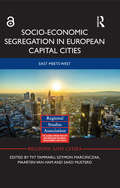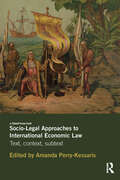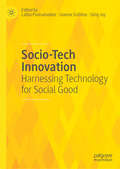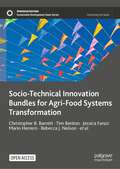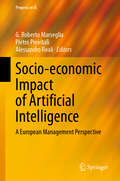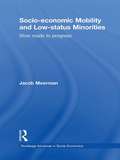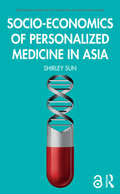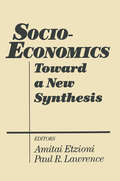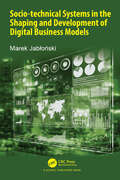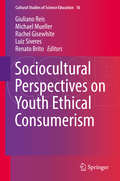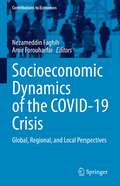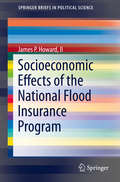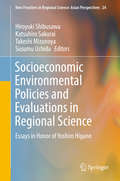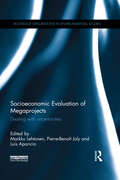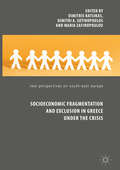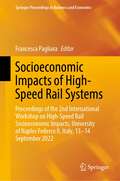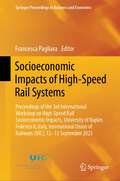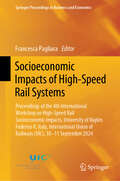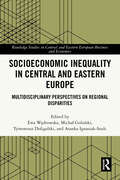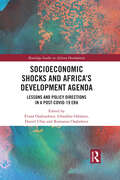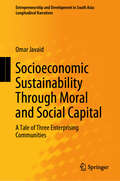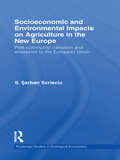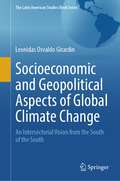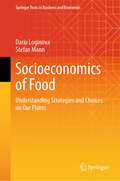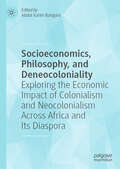- Table View
- List View
Socio-Economic Segregation in European Capital Cities: East Meets West (Regions and Cities)
by Sako Musterd Maarten Van Ham Tiit Tammaru Szymon MarcińczakGrowing inequalities in Europe are a major challenge threatening the sustainability of urban communities and the competiveness of European cities. While the levels of socio-economic segregation in European cities are still modest compared to some parts of the world, the poor are increasingly concentrating spatially within capital cities across Europe. An overlooked area of research, this book offers a systematic and representative account of the spatial dimension of rising inequalities in Europe. This book provides rigorous comparative evidence on socio-economic segregation from 13 European cities. Cities include Amsterdam, Athens, Budapest, London, Milan, Madrid, Oslo, Prague, Riga, Stockholm, Tallinn, Vienna and Vilnius. Comparing 2001 and 2011, this multi-factor approach links segregation to four underlying universal structural factors: social inequalities, global city status, welfare regimes and housing systems. Hypothetical segregation levels derived from those factors are compared to actual segregation levels in all cities. Each chapter provides an in-depth and context sensitive discussion of the unique features shaping inequalities and segregation in the case study cities. The main conclusion of the book is that the spatial gap between the poor and the rich is widening in capital cities across Europe, which threatens to harm the social stability of European cities. This book will be a key reference on increasing segregation and will provide valuable insights to students, researchers and policy makers who are interested in the spatial dimension of social inequality in European cities. A PDF version of the introduction and conclusion are available Open Access at www.tandfebooks.com. It has been made available under a Creative Commons Attribution-Non Commercial-No Derivatives 3.0 license.
Socio-Legal Approaches to International Economic Law: Text, Context, Subtext
by Amanda Perry-KessarisThis collection explores the analytical, empirical and normative components that distinguish socio-legal approaches to international economic law both from each other, and from other approaches. It pays particular attention to the substantive focus (what) of socio-legal approaches, noting that they go beyond the text to consider context and, often, subtext. In the process of identifying the ‘what’ and the ‘how’ (analytical and empirical tools) of their own socio-legal approaches, contributors to this collection reveal why they or anyone else ought to bother--the many reasons ‘why’ it is important, for theory and for practice, to take a social legal approach to international economic law.
Socio-Tech Innovation: Harnessing Technology for Social Good
by Latha Poonamallee Joanne Scillitoe Simy JoyThis book defines socio-technological innovation and lays out different aspects of technology innovation and adoption literature as applied to socio-tech innovation and entrepreneurship. Socio-tech innovation refers to novel solutions that involve development or adoption of technological innovations to address social and/or environmental problems with a view towards creating benefit for the larger whole rather than just for the owners or investors. Unlike conventional technological innovation, socio-tech innovation either develops a product specifically for underserved markets and adopts a model in which the market is not an afterthought but the rai-son d’etre. Social ventures have not been as successful in scaling up, though technology innovation-led ventures have; therefore, meaningful actionable insights that can help social ventures scale up successfully can be gleaned by this process. This book offers researchers in innovation and entrepreneurship programs a unique and interdisciplinary approach to studying social innovation that is grounded in technology innovation. This book features a series of socio-tech venture cases that illustrate these dynamics and can be used in undergraduate and graduate courses.
Socio-Technical Innovation Bundles for Agri-Food Systems Transformation (Sustainable Development Goals Series)
by Steven James Christopher B. Barrett Stephen Wood Jessica Fanzo Tim Benton Roy Steiner Shenggen Fan Mario Herrero Rebecca J. Nelson Elizabeth Bageant Edward Buckler Karen Cooper Isabella Culotta Rikin Gandhi Mark Kahn Laté Lawson-Lartego Jiali Liu Quinn Marshall Daniel Mason-D'Croz Alexander Mathys Cynthia Mathys Veronica Mazariegos-Anastassiou Alesha Miller Kamakhya Misra Andrew Mude Jianbo Shen Lindiwe Majele Sibanda Claire Song Philip ThorntonThis open access book is the result of an expert panel convened by the Cornell Atkinson Center for Sustainability and Nature Sustainability. The panel tackled the seventeen UN Sustainable Development Goals (SDGs) for 2030 head-on, with respect to the global systems that produce and distribute food. The panel’s rigorous synthesis and analysis of existing research leads compellingly to multiple actionable recommendations that, if adopted, would simultaneously lead to healthy and nutritious diets, equitable and inclusive value chains, resilience to shocks and stressors, and climate and environmental sustainability.
Socio-economic Impact of Artificial Intelligence: A European Management Perspective (Progress in IS)
by Pietro Previtali G. Roberto Marseglia Alessandro RealiThis edited volume discusses ethical issues raised by the use of artificial intelligence (AI) in business. Written by academics and practitioners across Europe, this volume provides a regional management perspective on the consequences of AI, including potential effects on the business models of companies, strategic considerations regarding the construction of data-literate companies and workforces, and the limits and opportunities of proposed EU regulations. Providing a forum to hypothesise solutions for accelerating technology adoption while guaranteeing human dignity, this book will be valuable for researchers and students interested in management, AI, fintech, information systems, and sustainable business as well as managers and practitioners navigating the challenges of a data-driven future.
Socio-economic Mobility and Low-status Minorities: Slow roads to progress (Routledge Advances in Social Economics)
by Jacob MeermanThis book concentrates on ethnic minorities such as former slaves, outcastes and indigenous peoples dispossessed of homeland. These groups are universally without power, usually undereducated, and always victims of their fellow citizens. The book asks why these socially excluded groups remain at the bottom of their social hierarchies as the poorest of the poor, even in nations long committed to equal opportunity. Their slow progress has four causes: obviously discrimination and poor education, but also low economic growth and cultural heritage. Low growth limits revenues for schools as well as new job opportunities, and perpetuates traditional exploitative social relations and customs. Traumatic histories of enslavement or conquest may induce behaviours by victims that reduce upward mobility. Together these four interacting variables suggest a "mobility model" that explains the impasse. The book develops and applies this model to interpret and compare the mobility history of five stigmatized, low-status ethnic groups: U.S. African Americans, Japan’s Burakumin, Afro-Cubans, India’s Dalits (Untouchables) and Bolivia’s Highland Indians. The book also compares actions by governments and the groups themselves to overcome barriers to progress, including job quotas, boycotts, mass protests, and the unique kangaroo courts of Japan’s Burakumim. Meerman’s unusual cross-disciplinary approach and fascinating comparative studies of success and failure will appeal to scholars, development practitioners, and advocates working on issues of discrimination, poverty, equity and inequality in an ethnic context.
Socio-economics of Personalized Medicine in Asia
by Shirley SunThe second decade of the twenty-first century has witnessed a surging interest in personalized medicine with the concomitant promise to enable more precise diagnosis and treatment of disease and illness, based upon an individual’s unique genetic makeup. In this book, my goal is to contribute to a growing body of literature on personalized medicine by tracing and analyzing how this field has blossomed in Asia. In so doing, I aim to illustrate how various social and economic forces shape the co-production of science and social order in global contexts. This book shows that there are inextricable transnational linkages between developing and developed countries and also provides a theoretically guided and empirically grounded understanding of the formation and usage of particular racial and ethnic human taxonomies in local, national and transnational settings.
Socio-economics: Toward a New Synthesis (Ethical Economy Ser.)
by Amitai Etzioni Paul R. LawrenceThis work is organized in seven sections around major themes of socio-economics. The first section outlines socio-economics in an historical perspective, drawing on the "Methodenstreit" in the German school of economics at the turn of the century. Four additional essays view economic behaviour from the perspective of psychology, sociology and values outside the realm of economics. The second section of the book explores the process of choice and goals made by the variety of economic factors, among them factors that influence choices, values and motivations outside economics. The next two sections, each containing three papers, examine executive leadership and entrepreneurship from the broader socio-economic perspective. Section five includes papers that deal with the role of institutions in the modern political economy. It develops an institutional theory of markets, firms, human values in economic behaviour and investment in ethnic goals and morality. Section six focuses on the modern corporate culture considering collective human capital. The final three papers examine the boundaries that embrace the processes and activities of firms. They consider the bonds and relationships that develop between firms and organizations in the modern political economy.
Socio-technical Systems in the Shaping and Development of Digital Business Models
by Marek JablonskiThe aim of the monograph is to demonstrate different approaches to building business models, where the starting point is the joint examination of social and technical factors. In this way, business ecosystems are created without state borders, which, thanks to technological mergers, improves their performance in terms of effectiveness and efficiency. The monograph also aims to indicate the core aspects of designing and shaping digital business models based on the assumptions of the concept of socio-technical systems. The book presents a multidimensional approach to shaping digital platforms in the context of the determinants of complexity theory, business ecosystems and the taxonomy of various approaches to designing digital transformation solutions. Innovative algorithms and socio-technical and engineering models support the design of digital business models.
Sociocultural Perspectives on Youth Ethical Consumerism
by Giuliano Reis Michael Mueller Rachel Gisewhite Luiz Siveres Renato BritoThis exciting new book advances current practice-based and theoretical knowledge around how youth defines and engages with consumerism to provoke a larger conversation within science and environmental education. It is also geared towards unveiling those literacy praxes that can assist youth to adopt more ethically-oriented consumerist habits. More specifically, this book studies how youth's participation in the global consumer market intersects with media technologies, new literacies, as well as science and the environment from sociocultural perspectives. In addition, it considers how school science has mediated youth participation in hyper-consumerism, from food and technology to shelter and transportation. This important and timely book is a must-read for those interested in topics such as critical youth studies, critical media literacy, STEM, arts-based research, STSE education, citizenship education, cultural studies, policy studies, curriculum studies, socio-scientific issues, technology, sustainability, food studies, social justice, poverty, and consumer behaviour. A wide range of science, technology and environmental educators from Australia, Brazil, Canada, Netherlands and the United States have combined their perspectives to produce this exciting, innovative, timely and important book. It should be essential reading for all teachers, teacher educators and curriculum developers keen to address key issues raised by a commitment to assist students in refining their understanding of what constitutes socially, culturally, ethically and politically responsible consumer practices and supporting them in formulating and engaging in effective individual and collective action. Derek Hodson, Emeritus Professor of Science Education, Ontario Institute for Studies in Education (OISE), University of Toronto, Professor of Science Education at The University of Auckland (New Zealand), and Founding Editor of the Canadian Journal of Science, Mathematics and Technology Education (CJSMTE). The authors in the book deconstruct and analyse intricate economic, sociopolitical and affective networks that are behind the cycles of production, distribution and consumption of objects that are present in youngsters' daily lives and their attitudes towards them. Apart from breaking new ground by proposing and discussing socioculturally informed research about the topic, the book connects with pedagogical approaches that value critical perspectives on the nature of the relationship between science, technology, society and environment. It is a must-read for both researchers and practitioners interested in issues related to sustainability and citizenship education. Isabel Martins, Professor of Science Education, Universidade Federal do Rio de Janeiro/ Federal University of Rio de Janeiro (UFRJ).
Socioeconomic Dynamics of the COVID-19 Crisis: Global, Regional, and Local Perspectives (Contributions to Economics)
by Nezameddin Faghih Amir ForouharfarThis book depicts and reveals the socioeconomic dynamics of the COVID-19 crisis, and its global, regional, and local perspectives. Explicitly interdisciplinary, this volume embraces a wide spectrum of topics across economics, business, public management, psychology, and public health. Written by global experts, each chapter offers a snapshot of an emerging aspect of the COVID-19 crisis for the benefit of academics and students, as well as the institutional, economic, social, and developmental policymakers and health practitioners on the ground.
Socioeconomic Effects of the National Flood Insurance Program
by James P. HowardThis Brief presents a benefit-cost analysis of the National Flood Insurance Program (NFIP) as well as an evaluation of its cumulative socioeconomic effects. Created by Congress in 1968, the NFIP provides flood insurance protection to property owners, in return for local government commitment to sound floodplain management. Since 1994, the NFIP has included a Flood Mitigation Assistance (FMA) program to provide local communities with support for flood mitigation. This book offers quantitative evidence of the net social benefit of the NFIP for the years 1996-2010, including an independent assessment of the consumer benefit. Second, it provides distributionally weighted analysis to show the socioeconomic effects of payments and claims. Finally, this Brief includes an analysis of the change in government revenue attributable to the NFIP and FMA programs. The models used in each component of the analysis are usable by others for extending and revising the analysis. Providing a comprehensive analysis of this increasingly important federal policy, this Brief will be of use to students of environmental economics and public policy as well as those interested in risk management in the era of climate change.
Socioeconomic Environmental Policies and Evaluations in Regional Science
by Hiroyuki Shibusawa Katsuhiro Sakurai Takeshi Mizunoya Susumu UchidaThis book is a volume of essays celebrating the life and work of Yoshiro Higano, professor of Environmental Policy, Doctoral Program in Sustainable Environmental Studies, Graduate School of Life and Environmental Sciences, University of Tsukuba, Japan. Prof. Higano's research strongly focuses on the comprehensive evaluation of resources and research content for decision science and engineering, including simulation modeling for environmental quality control, the evaluation of environmental remediation technologies, integrated river (lake) basin management, and synthesized environmental policy. Yoshiro Higano is the past president of the Regional Science Association International (RSAI) and the current president of the Japan Section of the RSAI (JSRSAI). He also served as executive secretary for the Pacific Regional Science Conference Organizations (PRSCO). This edited volume covers a wide range of regional science approaches, theory, policy, evaluation, modeling, simulation, and practice. It is a valuable reference work for researchers, scholars, policy makers, and students in the field of regional science. The volume celebrates Prof. Higano's contributions to the JSRSAI, PRSCO, and RSAI. Essay contributors include his former students and a wide array of regional scientists, each with a personal connection to Prof. Higano.
Socioeconomic Evaluation of Megaprojects: Dealing with uncertainties (Routledge Explorations in Environmental Studies)
by Markku Lehtonen Pierre-Benoît Joly Luis AparicioThe governance and evaluation of ‘megaprojects’ – that is, large-scale, complex, high-stakes infrastructure projects usually commissioned by governments and delivered through partnerships between public and private organisations – is receiving increased attention. However, megaproject evaluation has hitherto largely adopted a linear-rationalist perspective to explain the frequent failure of such projects to meet the ‘iron triangle’ of performance criteria: delivering on time, within budget, and according to specifications. This approach recommends greater control and accountability to remedy megaproject ‘pathologies’. Drawing on empirical examples mainly from the transport sector and radioactive waste disposal, this book offers new perspectives to megaproject evaluation. Comprising contributions from leading experts in project evaluation and appraisal, this collection opens up new avenues by suggesting two ways of improving megaproject evaluation: 1) approaches that go beyond the dominant linearrationalist notion of policy processes, and emphasise instead the objective of opening up appraisal processes in order to enhance learning and reflexivity; and 2) approaches that extend evaluative criteria beyond the ‘iron triangle’, to cover the various socioeconomic impacts and preconditions for project success. This volume will be of great relevance to scholars and practitioners with an interest in megaprojects, energy and climate policy, radioactive waste management, urban design, and project planning and management.
Socioeconomic Fragmentation and Exclusion in Greece under the Crisis (New Perspectives on South-East Europe)
by Dimitris Katsikas Dimitri A. Sotiropoulos Maria ZafiropoulouThis volume uses new empirical evidence and analytical ideas to study phenomena of fragmentation and exclusion threatening stability and cohesion in Greek society in the aftermath of the crisis. The contributors argue that processes of fragmentation and exclusion provoked by the crisis can be observed on both a material and an ideational level. On a material level, rising levels of unemployment, poverty and inequality have produced new social security “outsiders”, while on an ideational level, a discursive-cultural shift is documented, which has led to new understandings and categorizations of new (and old) insiders and outsiders. Moreover, the volume attests to the aspirations, but also the limitations, of spontaneous civil society mobilization to address the social crisis. Finally, the volume offers a discussion of the political management of social fragmentation and exclusion in Greece both before and after the onset of the crisis. The book will be of interest to scholars and students of social policy and phenomena of poverty, social exclusion and economic inequality, civil society studies, and comparative political economy and politics.
Socioeconomic Impacts of High-Speed Rail Systems: Proceedings of the 2nd International Workshop on High-Speed Rail Socioeconomic Impacts, University of Naples Federco II, Italy, 13–14 September 2022 (Springer Proceedings in Business and Economics)
by Francesca PagliaraThis book offers new insights into the wider socioeconomic impacts of high-speed rail (HSR). Over the past few decades, significant investments have been made in these systems around the world. The use of public funds for the construction of high-speed rail offers a range of benefits, such as time savings, increased comfort, and reduced traffic congestion, as well as broader economic benefits, including the advancement of less developed regions. These proceedings feature papers presented at the 2nd International Workshop on the Socioeconomic Impacts of High-Speed Rail. The focus is on HSR’s impacts on equity and integration, the land use system, productivity, the environment, the tourism industry, and cooperation and integration with other modes of transport. The book provides an overview of the current state of practice from both theoretical and empirical perspectives. Consequently, it will be of interest to scholars of transportation economics and related fields, as well as transportation industry professionals.
Socioeconomic Impacts of High-Speed Rail Systems: Proceedings of the 3rd International Workshop on High-Speed Rail Socioeconomic Impacts, University of Naples Federico II, Italy, International Union of Railways (UIC), 12–13 September 2023 (Springer Proceedings in Business and Economics)
by Francesca PagliaraThis book offers new insights into the wider socio-economic impacts of high-speed rail (HSR). Over the past few decades, significant investments have been made in these systems around the world. The use of public funds for the construction of high-speed rail offers a range of benefits, such as time savings, increased comfort, and reduced traffic congestion, as well as broader economic benefits, including the advancement of less developed regions. These proceedings feature papers presented at the 3rd International Workshop on the Socioeconomic Impacts of High-Speed Rail. The focus is on HSR impacts on the environment, on the land use system, on investment, on the tourism industry, on inclusion and on cooperation vs integration with other transport modes. The book provides an overview of the current state of practice from both theoretical and empirical perspectives. Consequently, it will be of interest to scholars of transportation economics and related fields, as well as transportation industry professionals.
Socioeconomic Impacts of High-Speed Rail Systems: Proceedings of the 4th International Workshop on High-Speed Rail Socioeconomic Impacts, University of Naples Federico II, Italy, International Union of Railways (UIC), 10-11 September 2024 (Springer Proceedings in Business and Economics)
by Francesca PagliaraThis book offers new insights into the wider socioeconomic impacts of high-speed rail (HSR). Over the past few decades, significant investments have been made in these systems around the world. The use of public funds for the construction of HSR offers a range of benefits, such as time savings, increased comfort, and reduced traffic congestion, as well as broader economic benefits, including the advancement of less developed regions. These proceedings feature papers presented at the 4th International Workshop on the Socio-economic Impacts of High-Speed Rail. The focus is on impacts on the land-use system, competition vs. integration with alternative transport modes, investment, and evaluation. The book provides an overview of the current state of practice from both theoretical and empirical perspectives. As such, it is of interest to academics in transport economics and related fields, as well as professionals in the transport industry.
Socioeconomic Inequality in Central and Eastern Europe: Multidisciplinary Perspectives on Regional Disparities (Routledge Studies in Central and Eastern European Business and Economics)
by Tymoteusz Doligalski Michał Goliński Ewa Wędrowska Aranka Ignasiak-SzulcThis book is a multifaceted examination of the nature of inequalities in CEE countries. While progress has been made, significant inequalities persist, and a deeper understanding of these challenges is essential to fostering meaningful action towards a more inclusive and prosperous future.Written by scholars from two leading higher education institutions in Poland – the Nicolaus Copernicus University in Toruń and the SGH Warsaw School of Economics – this comprehensive research monograph examines the disparities that shape the region and offers a nuanced understanding of their origins, manifestations, and consequences. Moving beyond simplistic narratives of post-communist transformation, the book analyses the contemporary realities of CEE, exploring socioeconomic, technological, and infrastructural disparities. It investigates inequalities in income, healthcare, education, energy access, public transport, innovation, and digital inclusion, revealing the vast differences within and between countries.The book is an essential resource for anyone who wants to understand the complex realities of Central and Eastern Europe and explore the root causes of inequality in the region. It also includes policy recommendations on how to bridge inequalities to promote equal opportunities for various stakeholders. Combining rigorous research with accessible language, the book provides an overview of the challenges and opportunities ahead and will appeal to those interested in the future of the region, from researchers, academics, and students to policymakers.
Socioeconomic Shocks and Africa’s Development Agenda: Lessons and Policy Directions in a Post-COVID-19 Era (Routledge Studies in African Development)
by Gbadebo Odularu Evans Osabuohien Daniel Ufua Romanus OsabohienThis book investigates how African countries respond to socioeconomic shocks, drawing out lessons to help to inform future policy and development efforts. The challenges posed by the COVID-19 pandemic affected all sectors of the economy, exposing substantial structural weaknesses and complexities in supply chains and logistics across the African continent. This book examines the disruptive impact of the pandemic across Africa. However, it also goes beyond the current crisis to investigate how socioeconomic pressures in general impact commodity prices, national budgeting processes, food, business, energy sectors, education, health, and sanitation. Overall, the book presents evidence-based solutions and policy recommendations to enable readers to improve resilience and responses to future crises. The insights provided by this book will be of interest to policymakers and development agencies, as well as to researchers of global development, politics, economics, business, and African studies.
Socioeconomic Sustainability Through Moral and Social Capital: A Tale of Three Enterprising Communities (Entrepreneurship and Development in South Asia: Longitudinal Narratives)
by Omar JavaidThis book examines how entrepreneurial communities in Pakistan and beyond counteract social disintegration fuelled by neoliberal economic practices. It highlights the role of moral and social capital in mitigating social pathologies such as alienation, exclusion, and inequality caused by the disintegration of traditional family and community networks. Through an in-depth analysis of family, community, market, and firm dynamics in ethnic entrepreneurial communities, the book highlights how these groups avoid disintegration through the cultivation and preservation of moral and social capital. Comparative insights from ethnic, minority and community based entrepreneurial contexts further enrich the analysis and contribute to current debates in economic sociology, development studies, and the anthropology of entrepreneurship. It also offers a valuable resource for policymakers and development practitioners interested in community-based strategies for achieving socioeconomic sustainability. This volume will appeal to scholars and advanced students in sociology, political economy, organizational studies, and community development.
Socioeconomic and Environmental Impacts on Agriculture in the New Europe: Post-Communist Transition and Accession to the European Union
by S. Serban ScrieciuThis book looks at agriculture and the environment, placed within the dynamic context of post-communist societal change and entry into the European Union (EU). Scrieciu explores developments in eleven Central and Eastern European (CEE) countries and argues for agriculture’s natural place in these societies. The history of these countries is significant in how it has shaped the institutions and influenced the outcomes. In many cases, during communism, agriculture was not considered a strategically. An ecological consciousness did not figure high on the agendas of authoritarian regimes. After 1990, some post-communist farm economies progressed slower than others, and environmental pressures mostly diminished with agricultural restructuring. In parts of CEE, increases in numbers of low-input small farms have resulted in some, though largely unintended, ecological benefits. A dual environmental challenge has nevertheless surfaced. On one hand, environmentally unsustainable practices have been attributed to some low-input farming. On the other hand, risks of farm over-intensification and resource overexploitation are on the rise. Also, environmental regulatory and institutional frameworks are not always effectively in place. EU membership is not creating the anticipated benefits for farm growth. There are a number of systemic structural barriers preventing many farmers from drawing on Common Agricultural Policy incentives and support. The presence of many vulnerable poor farms is clearly problematic, particularly economically. However, small-scale farms could be made more acceptable and profitable by ensuring EU policies acknowledge their value and by building institutions to support alternative farm growth strategies, aside from the traditional European model of individual corporate farm expansion. The voluntary uptake of grassroots rural cooperation and farm associations may represent such an alternative. Future European farm policy reforms need to reach the small and vulnerable, and better tackle issues of farm equity, poverty, and agricultural sustainability in the new Europe. This is a timely contribution as this type of "transition" has just begun. This book should be of use to students and researchers looking at agricultural and environmental economics, post-communist rural societal change, European integration and the Common Agricultural Policy.
Socioeconomic and Geopolitical Aspects of Global Climate Change: An Intersectorial Vision from the South of the South (The Latin American Studies Book Series)
by Leonidas Osvaldo GirardinThis book discusses climate change from an academic point of view centered on and from Latin America. Although climate change is a global issue, there has been a notable lack of input from the Latin American perspective, which means that many Latin American intellectuals often bring ideas, tools and potential solutions proposed by external, international research centers or organizations to the region. This book embraces a Latin American viewpoint to critically engage the problem and many of the concepts used in the analysis of climate change.The text emphasizes heterogeneity as an essential factor that cannot be absent in the analysis of how to understand and face the challenges posed by climate change. This heterogeneity refers not only to the magnitude of the impact that different regions will experience (including in their productive activities, ecosystems and social groups), but also to their contexts and capacities. Different countries' and regions' historical accumulated emissions—the primary cause of the current atmospheric concentrations of greenhouse gases—can inform current responsibilities, and their diverse productive structures will also contribute to different baselines in energy, agriculture and other sectors. Asymmetries in economic, technological and political capacities to face climate-related challenges will influence the social and economic costs of potential adaptation and mitigation measures.Using this conceptual approach, the book focuses on some of the main climate change-linked impacts expected in the region, such as effects on semi-arid ecosystems, and feasible, sector-specific adaptation measures. Furthermore, it contextualizes mitigation measures that appear on the international agenda (including the utilization of economic instruments to flexibilize the fulfillment of climate commitments) in the Latin American region.Socioeconomic and Geopolitical Aspects of Global Climate Change: An Intersectorial Vision from the South of the South offers socioeconomic and geopolitical analysis from the perspective of a region that is going to suffer impacts disproportionately greater than its historical and current responsibility in triggering this global environmental threat.
Socioeconomics of Food: Understanding Strategies and Choices on Our Plates (Springer Texts in Business and Economics)
by Stefan Mann Daria LoginovaThis textbook provides an introduction to the socioeconomics of food. Aimed mostly at students of economics and related social sciences, it explains how food markets function and what social and cultural factors influence the processes of food production and consumption. It also discusses the role of food producers, intermediaries, and consumers and examines the dynamics of prices, trade, and externalities.The book also highlights cultural and demographic processes and moral behaviors that shape production and consumption practices. Furthermore, it discusses issues of food quality, ethics, and politics. Readers are also introduced to food databases and methods of data processing.
Socioeconomics, Philosophy, and Deneocoloniality: Exploring the Economic Impact of Colonialism and Neocolonialism Across Africa and Its Diaspora
by Abdul Karim BanguraExisting paradigms such as &“decoloniality&” simplify the complex dynamics between former colonies and colonial powers. Such frameworks overlook the role of local elites in maintaining and even enhancing oppressive systems. They also imply that external forces are responsible for ongoing exploitation. This book tackles this concept head on by introducing a new methodology called &“deneocoloniality.&” Deoneocoloniality expands on decoloniality and neocolonialism. It argues that, while decoloniality focuses on the residual impacts of colonialism by external forces, it neglects the internal dynamics where former colonized elites play a significant role in perpetuating oppression for personal gain. The book presents socioeconomic and philosophical case studies to support deneocoloniality as a more comprehensive framework for understanding current realities in African countries. Readers will gain a nuanced understanding of the intricate power structures affecting developing nations. The book provides a structured methodology for analyzing problems, emphasizing the importance of logical reasoning and collaborative efforts. It offers practical solutions based on deep analysis, moving beyond mere diagnosis to actionable recommendations. This approach aims to equip readers with the tools needed to develop policies and strategies that address both external and internal sources of oppression.
